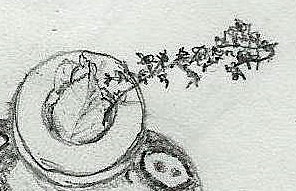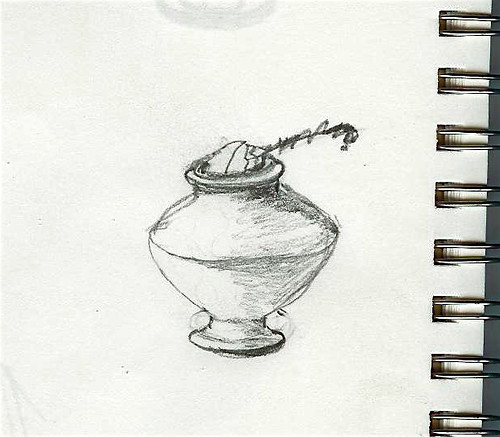 Things continue to happen. I continue to attend and to remember. Life is not lost on me. But I sit down at the computer desk, and the soggy-cotton-ball headache in my brain fogs up the glass with the breath of my thinking--I can't see clearly into the landscape of ideas, hopping from one spot to another with an imagining architect's eye. I don't have the patience. Now is, perhaps, a time for gathering in and hoarding. There will be months of winter in which to recall, from within the darkness, that moment last night when I wandered from room to room in my apartment, seeking to touch the brick bones of the building; or the walk through the park without my glasses, when space was rendered physical, a visual dimension, and distant leaves hung in silhouette against the afternoon sunlight, blurry, glistening, radiating orbs of gold and green; or a thousand other impressions and moments. I'm harvesting them, I am making the effort to anchor myself in the here-now. The brain, like the heart, is a muscle, which must be rested in order to be properly maintained.
Things continue to happen. I continue to attend and to remember. Life is not lost on me. But I sit down at the computer desk, and the soggy-cotton-ball headache in my brain fogs up the glass with the breath of my thinking--I can't see clearly into the landscape of ideas, hopping from one spot to another with an imagining architect's eye. I don't have the patience. Now is, perhaps, a time for gathering in and hoarding. There will be months of winter in which to recall, from within the darkness, that moment last night when I wandered from room to room in my apartment, seeking to touch the brick bones of the building; or the walk through the park without my glasses, when space was rendered physical, a visual dimension, and distant leaves hung in silhouette against the afternoon sunlight, blurry, glistening, radiating orbs of gold and green; or a thousand other impressions and moments. I'm harvesting them, I am making the effort to anchor myself in the here-now. The brain, like the heart, is a muscle, which must be rested in order to be properly maintained.With that in mind, here are a few random bits of journaling and letter-writing from over the past week or so, to tide you over, and to promise more to come.
The Vase
After all, there was the vase--I could see it. I could make a line on paper, I could compare this line with the image of the vase. I had eye enough to recognize when they did not match, and yet erase and redraw as I might, I somehow couldn't much improve, I couldn't bring the sketch to reflect the actual image I saw before me. Why not? What fluke of the brain was impeding the hand? This was a matter of seeing, not of doing. I was convinced that if I could "see better" I would be able to draw better. Somehow, I had to figure this out.
Sketching a small, deep blue, hand-painted Brazilian vase had become an exercise in memory and perception. What I perceived (and thus drew immediately, eye to paper) was fragmented, a marriage of ill-matched angles and proportions, a shifting visual mirage where this moment's shadow was tacked onto last moment's curved neck, which sprang precariously from the rounded angles of a base and belly drawn to different moments' scales. But when I gave up, frustrated, and sat back to sketch the damn, simple thing from memory--there it was. The form of it, the completeness of the thing, compressed into a sudden whole by the integrating, effacing processes of recall. Perspective and subtle change forgotten, memory proved the more realistic guide.
 Somewhere in my sunconscious, imaginative brain, there exists an artist who knows what she is doing and might, with practice, make passable sketches of, say, birds and trees and things. Apparently, my conscious attempts at art have stalled at the ten-year-old level, unable to make the leap into cubism and the modern, playful but skilful abandonment of perspective. We must investigate this discrepancy further.
Somewhere in my sunconscious, imaginative brain, there exists an artist who knows what she is doing and might, with practice, make passable sketches of, say, birds and trees and things. Apparently, my conscious attempts at art have stalled at the ten-year-old level, unable to make the leap into cubism and the modern, playful but skilful abandonment of perspective. We must investigate this discrepancy further.A Philosophical Opinion of Pleasure
Perhaps pleasure is a mechanism of the real, to which we should attend with as much seriousness as we attend to questions of morality, purpose, will, art, religion... What is the function of pleasure? And by this, I mean not only physical pleasure--though, perhaps, all pleasure is to some extent physical. Another strangeness. Aesthetic pleasure, utilized carefully to thrill or disgust, excites the faculty of attention. There is a bridge between body and mind, and that bridge is sensation. If we attend carefully to sensation, how can we avoid pleasure? How could we possibly shun it? How could we claim that we do not, to some extent, seek it out?
Pleasure circulates, it corrodes the easy categorical walls that the mind makes. The eyelid, the shoulder, the useless skin of the earlobe--these are not extraneous to the beloved, not ignored by the lover. They are representative of the whole, they communicate to the rest. A lover, dazed in pleasure, makes no distinctions, kisses anything.
We mistake convenience, addiction, lust for pleasure. We've forgotten what real pleasure feels like, the pleasure of health, the thrill of simplicity, balance and the sounding of a single, pure tone in the rising chord of creative coexistence. This is sacred pleasure, that of gratitude and grace.
Listen.
Evening Solitude & Sadness
I tried for a moment to get a view of my sadness, a feel for it, maybe. A shift in perspective. Am I actually sad? Is any of it real, or are these simply useless, irrelevant emotions (and wouldn't that, anyway, be somehow just as awful, to be so subject to such useless, meaningless feelings and for feelings themselves to be useless, meaningless)? I stepped back and saw my sad little self sitting in this dark, empty space of a living room--and I felt: there I am, still sad and lonely and small, inside a great, beautiful night that is so full of grace and potential and quietness. They both exist. I am content and sad at once. Maybe it's selfish to want to be happy, to want relief from always feeling a sneaking loneliness underscoring everything. Maybe everyone feels this way, all the time, and that's how it is--moments of perspective in which the world and life are utterly beautiful, and the surrounding void in which the very same world and life, unchanged, seem superfluous and stupid. But then, I am back to faith--how can love and hope mean anything if this is just how reality is? In what way do they function, what is the purpose? I do not want to deceive myself, I do not want to color everything in with hearts and roses and pretend love will save the day. But how can I live without it? Why should I be expected to? It's all just noise and nonsense otherwise. Can I reject it--a loveless life and a world in which love falters and fails--on principle, even if it means rejecting what actually is? I want to hold both things--love, and the actual world--and cherish both, believe in both. I don't know if that's possible.
I'm afraid I'm going backwards, devolving. I'm afraid I'm losing the way, that I'm worse than I used to be, that I do not love as well or as boldly, and that I can't get it back. Having lunch with a friend, I'm okay and happy and peaceful, except of course that I am becoming an awful person who laughs and has no hope. With a friend, I am not so bothered by my awfulness, my apparent disability. It's only when I'm alone that I can't justify it. I should not let the sadness of my solitude prevent me from being useful to the community of creation. But I feel so weighed down by it. They--the mysterious Other--demand that I be happy on my own, be completed and whole as an isolated being; but if I am, there is no reason to seek the Other in the first place. Which is worse: to feel, painfully, a kind of isolation; or to actually be isolated, so cut off that you no longer even desire connection?

We all need a break every now and then. I have not been writing much in my blog nor reading others. So it seems I caught up with yours right at the point that you have taken your sabattical. I like all of these short pieces quite a lot, particularly your reflections on pleasure.
ReplyDelete